The Dark Crystal debuted in 1982, wedged somewhat oddly between The Great Muppet Caper and the premiere of Fraggle Rock in the Great Muppet Time Line. In terms of Jim Henson’s career, placing the film chronologically is easy; figuring out how it fits into his development as an artist is a bit more complicated.
The project that eventually became The Dark Crystal actually began several years earlier when Henson fell madly in love with the work of fantasy illustrator Brian Froud; they became friends, and Froud began collaborating with Henson and Frank Oz. With the help of David Odell, a former staff writer for The Muppet Show, they eventually produced the first live-action film to feature no human actors, only puppets and animatronic creatures.
The film was groundbreaking in many ways, and yet it was not considered a financial success upon release, and is often described as something of a “near classic” even by its fans. I’ve always harbored mixed feelings toward The Dark Crystal; even as a kid, I remember having the sense that there were so many aspects of the movie that worked…but somehow all those amazing parts never seemed to come together, in the end. And so, for the first time in years, I decided to take another look.
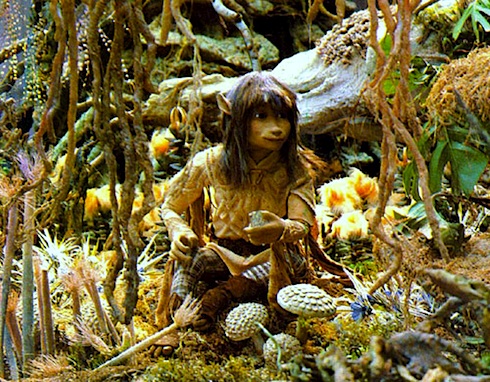
The basic plot of The Dark Crystal centers around Jen, who believes himself to be the last of the peaceful Gelflings; Jen looks a bit like an elf and acts a lot like a hobbit as he’s ripped from his comfort zone and sent upon the quest to fulfill his destiny. He’s fairly brave, but also clueless, and has a tendency to whine about not knowing what he’s doing. The audience knows the score, however, thanks to the helpful narration that opens the movie — a thousand years ago, everything was great until the titular Crystal cracked, and two new races appeared. The corrupt and evil Skeksis took over, while the wise and gentle Mystics went off to practice their “natural wizardry” in a delightfully mellow commune far from the buzz-harshing Skeksi empire.
The movie begins with the simultaneous deaths of the Skeksi emperor and his counterpart among the Mystics, who has raised the orphaned Jen. On his deathbed, Jen’s beloved Master reveals that the young Gelfling is destined to fulfill an ancient prophecy, find the missing shard and heal the Crystal before the planet’s three suns align in the sky — otherwise, the world will descend into eternal darkness. Confused and doubtful, Jen resigns himself to his fate and sets out on his journey….
So far, so good, right? I will say that the first ten or fifteen minutes of the movie seem even darker and more violent than I’d remembered — how many family movies kick things off with two deathbed scenes, followed immediately by a brutal battle for power between rival Skeksis? Featuring giant axes, and a lot of shrieking. It’s intense. So, maybe this isn’t a movie for the faint of heart, but at least we know where the story’s going, and we can settle in for a classic quest narrative….
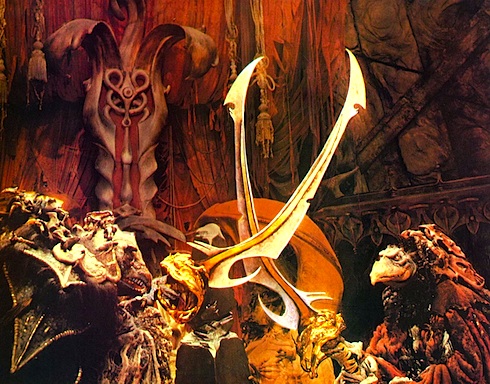
Unfortunately, during the first two thirds of the movie, tagging along on Jen’s journey means slogging through A LOT of exposition, a good deal of which seems unnecessary thanks to the opening narration. Perhaps I wouldn’t mind if Jen were less of a milquetoast, but in Muppet terms, he’s kind of like an emo Kermit the Frog, if Kermit were robbed of any detectable sense of humor or gumption, wringing his hands and kvetching (or whatever the Gelfling equivalent of kvetching is), from one scene to the next. Luckily, he soon encounters a couple of far more interesting characters in the form of Aughra, the scholar who supplies him with the missing crystal shard, and Kira, a fellow Gelfling.
Aughra, it must be said, is pretty amazing. She’s vaguely terrifying, brilliant, no-nonsense, and fearless in the face of the Skeksis and their huge, crustacean-like henchman (hench-creatures?), the Garthim. Plus, her observatory is one of the most magnificent set pieces in a film brimming with magnificent visuals — it’s absolutely breathtaking. I remember being slightly scared of Aughra as a little kid, but also really liking her, and I stand by that reaction; she’s a bit of a benevolent bully, but Jen desperately needs a bit of bullying to send him on his way.
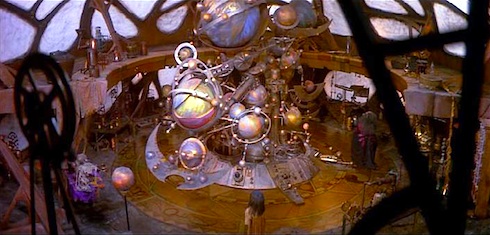
After Aughra is attacked and captured by the Skeksis, Jen is lost again until he meets up with Kira. A much more dynamic character than Jen, Kira is savvier, more adventurous and self-reliant. The movie also makes a point of playing up the fact that she’s a female, which is interesting given the asexual appearance of most of the other creatures in the movie: Kira uses her wings to carry Jen to safety in one scene, much to Jen’s surprise: “Wings! I don’t have wings!” he exclaims; “Of course not,” Kira answers, “You’re a boy.” Kira is fearless and committed to the quest; she’s everything that Jen is not, in other words, and only through her eventual sacrifice is he able to finally reach the Crystal and do what needs to be done. The gender politics of the film are certainly interesting… and while it would be nice if The Dark Crystal offered interesting gender politics AND a genuinely interesting protagonist, at least the supporting characters are ready, able, and willing to steal the show.
For all my own kvetching, as I mentioned in the beginning, what this movie does well, it does spectacularly well. Henson and Froud managed to create amazingly detailed, lush, gorgeous settings and populate those settings with creatures that look like nothing on earth — utterly fantastic, but also somehow believable. When designing the various characters and concept art, Froud avoided modeling his creatures after existing, real-world animals, so what we see on the screen is essentially his imagination brought to life through the skill and technical innovations of Oz and Henson.
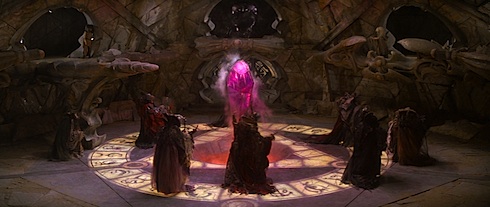
Even if the movie had been completely silent (or had featured a constructed language, as Henson had originally planned for the Skeksis’ scenes), the film would still rank as a major milestone, even in a career as brilliant as Jim Henson’s. As a narrative, it might have a few flaws, but as work of fantasy art and a triumph of puppetry, animatronics, and the sheer force of talent and imagination, there’s no denying the power of The Dark Crystal.
Bridget McGovern really needs to share this early deleted scene in which Frank Oz performs the voice of Aughra. You haven’t really lived until you’ve heard the voice of Fozzie, Bert, Yoda and Evil Grover casually discussing the coming apocalypse. Either I need a drink, or Aughra needs an exorcism. Probably both.










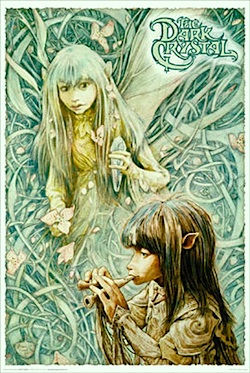
I loved this movie as a kid, but I haven’t seen it in years. Must track down a copy…
This movie was my introduction to fantasy at a tender young age, long before I discovered The Hobbit and The Legend of Zelda. Mesmerizing, terrifying, and delightful, it is still one of my favorites.
Thank you, Mr. Henson and Mr. Froud.
I was too young when I saw this as a kid and it freaked me out. I haven’t yet gotten up the courage to watch it since.
I think I wore out our taped-off-TV VHS when I was a kid. Loved loved LOVED this movie, and it informed quite a bit of my own early creative output as well.
I recently hit up Netflix to see if it was available for streaming, and it was! Haven’t convinced the kids to check it out yet, though.
I believe this was my intro to fantasy as well…at least, what I would call the classic “Quest Fantasy.”
I just watched a double feature of this and the Labyrinth back to back at a retro movie theater where I live, in San Jose…it was nerd-tastic!
This was another of the formative Fantasy movies I experienced as a child. I convinced my second grade teacher to show it to our class before one of our breaks from school. After she lent me the Marvel comic of the movie, that is.
It amazed me as a kid and it still does, though the narrative does drag a bit. Proof that Henson and Oz and all the others involved in this movie were far, far ahead of their time. I wish the same could be said for moviemakers today.
“…the first live-action film to feature no human actors, only puppets and animatronic creatures”
Almost the first. There were two Thunderbirds movies made with marionettes in the ’60s. Also, Henson made Emmet Otter’s Jug-Band Christmas in 1977; that was done for TV, but it was an hour long and pretty elaborate.
I loved this film when I was a kid… I still want an observatory like Aughra’s. ::nods::
Hey, Taryntula, we were in that theater together!
One of my friends had earlier mentioned that The Dark Crystal was something you couldn’t really go back to, and I didn’t want to believe, but I can sort of see where he’s coming from. It does drag, and most of the dialogue is bad. But man, the special effects are good! Go see how things looked before everything was barfed out of a computer. The Crystal itself is a fantastic, beautiful thing, the like of which we will not see in a movie today. Also good: the music. And it’s still scary.
Even as a kid I remember not loving the actual movie as much as I wished I could, but the art and the world was a _huge_ inspiration to me. I would spend hours drawing from the Art Of book. So many hours that I quickly wore out the binding— that giant book became a folder of lose sheets. Man, I hope someone in the family still has it.
I still love this movie. I love the look of it – how accepting I am of that world even though I know that everything (except the water) had been designed and created just for that movie.
I loved Jen because he was a wimp. He was a kid (teenager?) not an adult fully trained to go on a great quest. He had to really think about what to do after Aughra dropped the shards in front of him. He was unsure of himself most of the time but he also (and just like a teen) expressed sureness and pride when he explained writing to Kira.
I agree with Madeline’s comment about the music. It is very good and it’s one of the soundtracks I like to listen to when I work on art work.
The making-of documentary got a lot of play on HBO back in the day, and I remember being completely fascinated by it, even more so than the movie itself. What craft! What artistry!
I inadvertently named my child after a character in The Dark Crystal, which I didn’t realize until I had Kira watch it. I know I only saw the movie once or twice as a kid, but I “read” the book-on-tape Easy Reader version of The Dark Crystal hundreds of times till the cassette wore out.
Ever since reading The Way of Kings, I’ve wondered how many times Brandon Sanderson watched The Dark Crystal growing up. Chulls/chasmfiends vs. Garthim, retracting plantlife . . .
3. TheDoctor
My reaction exactly. I had trouble falling asleep that night. Not sure if I can remember that ever happening to me before or since.
The newly-remastered version is unbelievably gorgeous, and reminded me again why I forgave the movie its flaws.
I loved this movie as a kid but have to say I dont think it holds up well. Watched it this summer with my kids on Netflix.. It seemed slow, dated and there were definitely parts where the puppet movements didnt seem as smooth as they should be, especially the skeksis (I know I am not describing that well). It is definitely a good movie, but not as great as I remember it.
I have to agree with Neuralnet. I absolutely loved this movie when I was a child. When I watched it again in high school I found it horribly slow and boring. I’ll have to watch it again to give it a fair review. It’s been about 17 years since my last viewing. I do look forward to my children being old enough to watch it – the Skeksis are still too scarey. It’s a classic that I will add to my movie collection one day.
I had the same reaction as most: the Skesis scared the ever lovin’ CRAP out of me when I was a kid, and I only was able to go back and watch it again once I got to college. And you know what’s best to conquer phobias? Inundate yourself with it to become desensitized to it. So what did I end up doing? I married one of the biggest Dark Crystal fans on the face of the planet. It’s watched in our house at least once a month (from one of the 5 copies we own). There are posters and books of it everywhere. Dolls. Statues. And she’s getting ready to get a Dark Crystal tattoo sometime in the near future.
The film is still epic for me even after all this time though, design is lush, and the muppets are amazing.
There’s been talk of a sequel on and off for about 5 years now, and at one point Gennedy Tartarovski was attached to it, but I’m not sure if anything more than concept art from Froud has come of it. If they do make it, I hope they get it done sometime soon before Froud passes on or gets shanked by a crazy wood elf at Fairyworlds that he attends every year here in Eugene, OR.
Then again, I’m not sure if I want them to make it, as Hollywood seems incapable of any original ideas anymore, much less making movies like Henson did back then. Such a shame.
Lord Chamberlain always reminded me of Starscream (from Transformers), so I never really found the Skesis particularly scary. :)
I loved The Dark Crystal as a kid. But what I had was a copy of the VHS version (not an original tape). The creatures at the end were nothing but big white blobs on the screen. When I discovered DVDs almost 15 years later, one of my first thoughts was that I wanted to see this on DVD so I could see what those things looked like. I believe that this was, in fact, the very first DVD I bought for myself. And I was not disappointed at all.
Time to introduce it to my kids. And maybe scare them a bit.
@DaedylusSL (#20):
This movie was the first DVD I bought for myself, too–and that was before I even got a DVD player. I’ve bought it AGAIN on DVD since then.
@13 I totally wondered about how much Sanderson took from this, too, especially with the constant storms wracking the plain around the Crystal Castle and all the crustacean life (and glowing orbs all over–think of the Scientist’s laboratory).